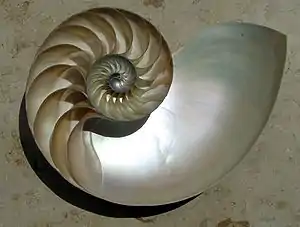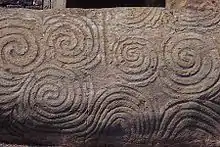مارپیچ
مارپیچ در ریاضیات، یک خم است که از یک نقطه مرکزی سرچشمه میگیرد و به تدریج از نقطه مرکزی دورتر میشود.

نگارهای سیاهوسفید از راهپلهٔ مارپیچ سیتیهال لندن.
ساختمان سیتیهال لندن توسط نورمن فاستر، آرشیتکت برجستهٔ بریتانیایی طراحی و توسط گروه مهندسی آروپ ساختهشد.
ساختمان سیتیهال لندن توسط نورمن فاستر، آرشیتکت برجستهٔ بریتانیایی طراحی و توسط گروه مهندسی آروپ ساختهشد.

سطح برش خوردهٔ یک صدف با خانههایی تقریباً مرتب با اسپیرال لگاریتمی.
مارپیچهای دو بعدی
مارپیچهای دو بعدی در دستگاه مختصات قطبی به صورت زیر هستند:
- مارپیچ ارشمیدس
- مارپیچ طلایی
- مارپیچ لگاریتمی
- مارپیچ فیبوناچی
- مارپیچ سینوسی
- مارپیچ هذلولوی
- مارپیچ اویلر
- مارپیچ فرما
مارپیچهای سه بعدی
مارپیچهای سه بعدی در دستگاه مختصات استوانه ای به صورت زیر هستند:
مارپیچ بعنوان نماد

لوحه سردر یک خانه ییلاقی
مایه اصلی مارپیچِ سه گانه نماد دوران نوسنگی در اروپا است. در حالی که آن را نماد سلتیک در نظر گرفتهاند اما مارپیچ سه گانه در واقع نمادی از پیشا سلتیک است.[1]
جستارهای وابسته
- الگو در طیبعت
- اعداد فیبوناچی
پانویس
- Anthony Murphy and Richard Moore, Island of the Setting Sun: In Search of Ireland's Ancient Astronomers, 2nd ed. , Dublin: The Liffey Press, 2008, pp. 168-169
منابع
- Cook, T. , 1903. Spirals in nature and art. Nature 68 (1761), 296.
- Cook, T. , 1979. The curves of life. Dover, New York.
- Habib, Z. , Sakai, M. , 2005. Spiral transition curves and their applications. Scientiae Mathematicae Japonicae 61 (2), 195 – 206.
- Dimulyo, S. , Habib, Z. , Sakai, M. , 2009. Fair cubic transition between two circles with one circle inside or tangent to the other. Numerical Algorithms 51, 461–476 .
- Harary, G. , Tal, A. , 2011. The natural 3D spiral. Computer Graphics Forum 30 (2), 237 – 246 .
- Xu, L. , Mould, D. , 2009. Magnetic curves: curvature-controlled aesthetic curves using magnetic fields. In: Deussen, O. , Hall, P. (Eds.), Computational Aesthetics in Graphics, Visualization, and Imaging. The Eurographics Association .
- Wang, Y. , Zhao, B. , Zhang, L. , Xu, J. , Wang, K. , Wang, S. , 2004. Designing fair curves using monotone curvature pieces. Computer Aided Geometric Design 21 (5), 515–527 .
- A. Kurnosenko. Applying inversion to construct planar, rational spirals that satisfy two-point G2 Hermite data. Computer Aided Geometric Design, 27(3), 262–280, 2010 .
- A. Kurnosenko. Two-point G2 Hermite interpolation with spirals by inversion of hyperbola. Computer Aided Geometric Design, 27(6), 474–481, 2010.
- Miura, K.T. , 2006. A general equation of aesthetic curves and its self-affinity. Computer-Aided Design and Applications 3 (1–4), 457–464 .
- Miura, K. , Sone, J. , Yamashita, A. , Kaneko, T. , 2005. Derivation of a general formula of aesthetic curves. In: 8th International Conference on Humans and Computers (HC2005). Aizu-Wakamutsu, Japan, pp. 166 – 171 .
- Meek, D. , Walton, D. , 1989. The use of Cornu spirals in drawing planar curves of controlled curvature. Journal of Computational and Applied Mathematics 25 (1), 69–78 .
- Farin, G. , 2006. Class A Bézier curves. Computer Aided Geometric Design 23 (7), 573–581 .
- Farouki, R.T. , 1997. Pythagorean-hodograph quintic transition curves of monotone curvature. Computer-Aided Design 29 (9), 601–606.
- Yoshida, N. , Saito, T. , 2006. Interactive aesthetic curve segments. The Visual Computer 22 (9), 896–905 .
- Yoshida, N. , Saito, T. , 2007. Quasi-aesthetic curves in rational cubic Bézier forms. Computer-Aided Design and Applications 4 (9–10), 477–486 .
- Ziatdinov, R. , Yoshida, N. , Kim, T. , 2012. Analytic parametric equations of log-aesthetic curves in terms of incomplete gamma functions. Computer Aided Geometric Design 29 (2), 129 – 140 .
- Ziatdinov, R. , Yoshida, N. , Kim, T. , 2012. Fitting G2 multispiral transition curve joining two straight lines, Computer-Aided Design 44(6), 591–596 .
- Ziatdinov, R. , 2012. Family of superspirals with completely monotonic curvature given in terms of Gauss hypergeometric function. Computer Aided Geometric Design 29(7): 510–518 .
- Ziatdinov, R. , Miura K.T. , 2012. On the Variety of Planar Spirals and Their Applications in Computer Aided Design. European Researcher 27(8–2), 1227-–1232 .
پیوند به بیرون
| در ویکیانبار پروندههایی دربارهٔ Spiral موجود است. |
- SpiralZoom.com, an educational website about the science of pattern formation, spirals in nature, and spirals in the mythic imagination.
- Spirals by Jürgen Köller
- Spirals – an Encyclopedia of Life collection with examples of spirals in nature.
- Archimedes' spiral transforms into Galileo's spiral. Mikhail Gaichenkov, OEIS
This article is issued from Wikipedia. The text is licensed under Creative Commons - Attribution - Sharealike. Additional terms may apply for the media files.
